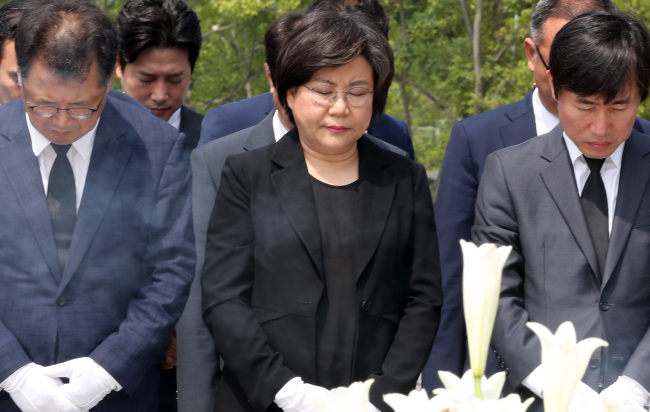[News Focus] Bareun Party charts new conservative course
By Jo He-rimPublished : July 12, 2017 - 18:27
Rep. Lee Hye-hoon, chairwoman of the conservative splinter Bareun Party, on Wednesday paid homage to the late former President Roh Moo-hyun, a liberal icon openly disdained by the conservative old guard.
“I will restructure true conservativism and make South Korea healthy, keeping balance between the right and left wing,” she wrote in the visitor’s book.
Meeting the widow, former first lady Kwon Yang-suk, she said her party and the late president have some common ground in their political visions.
“I will restructure true conservativism and make South Korea healthy, keeping balance between the right and left wing,” she wrote in the visitor’s book.
Meeting the widow, former first lady Kwon Yang-suk, she said her party and the late president have some common ground in their political visions.

“One of the core values that our party pursues is a fair market economy without foul play or favoritism. It goes in line with what the former President Roh sought,” she said.
Although Bonha village in South Gyeongsang Province is frequented by liberal politicians, including President Moon Jae-in, conservative leaders have shown reluctance to go there even for his official memorial ceremonies, refusing to show due respect and recognition to the former state chief.
Roh, who was president from 2003 to 2008, took his own life in 2009 amid an investigation into corruption accusations involving his family and associates.
During this year’s annual memorial ceremony in May, the main conservative opposition Liberty Korea Party sent its Secretary-General Park Maeng-woo to pay tribute, while chiefs from other parties all came to the event.
Rep. Lee’s visit to Roh’s grave thus perfectly encapsulates the party’s ongoing efforts to break away from “old conservatism,” represented by the much bigger rival Liberty Korea Party and to chart a distinctly new conservative course.
Elected to lead the party two weeks ago, Rep. Lee has made it clear that the party will be different and that its decisions will be rational and the process will be democratic. By showing what true conservatism is the party will represent the country’s political right, she has said.
The new chief also signaled a departure from anti-communist McCarthyism, a frequently used election tactic for conservative politicians. South Korea is technically still at war with the communist North Korea.
“Conservatives have claimed that it holds strength in national security issues, but it (Liberty Korea Party) has often attacked anyone who opposes its stance as North Korean followers,” Lee said, lashing out at Liberty Korea Party in a local radio interview two days after she was elected.
“Instead of labelling opponents as being pro-North, we really need to care about national defense and also work to get rid of wrong and unfair treatment in the market.”
The Bareun Party’s attempt at reform appears to be fresh to some. It is also trying to grab the attention of younger supporters in their 20s and 30s who have become their main supporter base.
On Monday, they started a debate tournament, in which some of its lawmakers pair up with university students to discuss on social issues, including government’s role in increasing jobs in the public sector.
“Lee’s effort to pursue a new view of conservatives will be a positive influence on South Korean politics,” political science professor Lee Hyeon-woo from Sogang University told The Korea Herald.
“While it may be difficult for the party to win so many seats in the regional election in the near future, the Bareun Party would be able to absorb some of the diversified conservative voters from different age groups.”
The country has long maintained two-party politics, between the liberals and conservatives, but the multiparty system would now be able to represent the more specific needs of citizens, he added.
Currently, there are four political parties holding more than 20 parliamentary seats, meeting the requirement for negotiation body status at the National Assembly. Bareun Party is the smallest, with 20 lawmakers.
In the latest poll by Realmeter on Monday, the Bareun Party stood third with 6.6 percent of approval, trailing behind the Liberty Korea Party at 16.2 percent. The ruling Democratic Party topped the poll with 53.4 percent.
By Jo He-rim (herim@heraldcorp.com)











![[Hello India] Hyundai Motor vows to boost 'clean mobility' in India](http://res.heraldm.com/phpwas/restmb_idxmake.php?idx=644&simg=/content/image/2024/04/25/20240425050672_0.jpg&u=)








